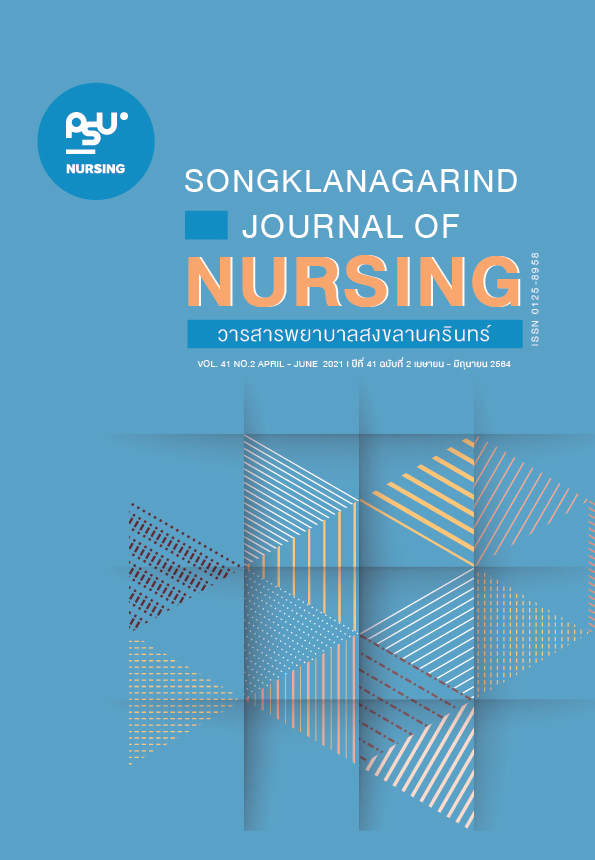The Effect of Simulation-Based Learning on Knowledge and Self-Efficacy of the Third Year Nursing Students in Caring for Emergency Patients
Main Article Content
Abstract
Objective: This quasi-experimental research aimed to study the effect of simulation based learning on knowledge and self-efficacy in patients with emergency care of the third year nursing student. Methods: Samples were 48 persons third of year nursing students who selected by simple random sampling. The
research instrument was the simulation-based learning (SBL) program and data collection tools were
knowledge test and self-efficacy in patients with emergency care. Data were analyzed by descriptive statistics and t-test. Results: The results revealed that mean score average of knowledge and self-efficacy in patients with emergency care of the third year nursing students of experimental within group after received SBL were higher than before that had statistically significant (p <.001) and mean score average of knowledge and self-efficacy in patients with emergency care of the third year nursing student of the experimental between group. The group received SBL group (experimental group) was higher than received regular study group (control group) that had statistically significant (p <.001). Discussion: This research suggests that nursing education in theories and practice should develope by using simulation based learning with regular learning.
Article Details
References
Bunma W. Effect of program for promoting emergency patient care skill toward perceived self-efficacy in emergency care among nursing students at Boromarajonani College of Nursing, Chiang Mai. Journal of Nursing and Education. 2018; 11(2): 74-86. Thai.
Bundasak T, Chaowiang K, Jungsem N, et al. Affecting factors on nursing students anxiety while practicing in
Intensive Care Unit. J Prapokklao Hosp Clin Med Educat Center. 2017; 34(1): 6-16. Thai.
Sukchareon P. The development of cognitive of nursing students by simulation-based learning. PSDS Journal of
Development Study Thammasat University. 2016; 13(1): 62-76. Thai.
Sinthuchai S, Ubolwan K, Boonsin S. Effects of highfidelity simulation-based learning on knowledge, satisfaction, and self-confidence among the fourth year students in comprehensive nursing care practicum. Rama Nurs J. 2017; 23(1): 113-27. Thai.
Kumkong M, Leejareon P, Aramrom Y, et al. Effect of simulation-based learning on perceived self-efficacy in
providing nursing care for advance life support to patients with critical illness or emergency condition among nursing students. The Southern College Network Journal of Nursing and Public Health. 2016; 3(3): 52-64. Thai.
Kaenbubpha N, Chomngam P, Nuangchalerm N. The effects of simulation-based teaching on perceived self-efficacy in cardio pulmonary resuscitation of students in Siridhorn College of Public Health, Ubon Ratchathani Province. Journal of Health Science Boromarajonani College of Nursing Sappasitthiprasong. 2018; 2(3): 63-78. Thai.
Bandura A. Social learning theory. New Jersey: Prentice Hall; 1987.
Grove SK, Burns N, Gray JR. The practice of nursing research: Appraisal, synthesis, and generation of evidence,
th ed. St. Louise, MO: Saunders Elsevier; 2013.
Koonkeaw A. Statistic for research. 2 nd ed. Bangkok: Chulalongkorn University; 2019. Thai.
Chaichanawirote U, Vantum C. Evaluation of content validity for research instrument. Journal of Nursing and Health Sciences. 2017; 11(2): 105-11. Thai.
Tatan S, Srijanpal W. Teaching method using simulationbased learning. Journal of Nurses Association of Thailand Northern Office. 2017; 23(1): 1-10. Thai.
Norkaeo D, Treenon P, Chabuakam N, et al. Nursing students knowledge and skills about basic life support
(BLS): The effects of simulation-based learning. The Southern College Network Journal of Nursing and Public
Health. 2018; 5(3): 84-95. Thai.
Suwannakeeree W, Jullmusi O, Tangkawanich T. Simulationbased learning management for nursing students. Journal of Nursing Science Chulalongkorn University. 2016; 28(2): 1-14. Thai.
Tantalanukul S. Development of instructional model with simulated situations to enhance performance in primary medical care of nursing students. Boromarajonani College of Nursing Utaradit. 2018; (Suppl): 124-36. Thai.
Tantalanukul S, Rattanasak S, Sengpanich C, et al. The effect of simulation-based learning on the ability development of primary medical care practicum of nursing students at College of Nursing Utaradit. 2016; 8(1): 49-58. Thai.
Sirited P, Thammaseeha N. Self-efficacy theory and selfhealthcare behavior of the elderly. Journal of The Royal
Thai Army Nurses. 2019; 20(2): 58-65. Thai.


